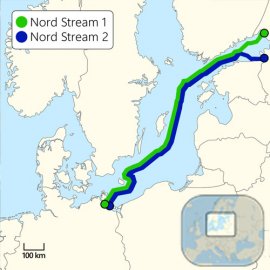The Nord Stream Line
-
English
-
ListenPause
[intro music] Welcome to World Ocean Radio… I’m Peter Neill, Director of the World Ocean Observatory. As the world turns around war and threats of war, the ocean may seem again a place apart. There is geopolitical anxiety in the Taiwan Straits for example, where naval operations and incremental bellicose gestures reveal the tension over control of key maritime areas and ship routes that affect other financial maneuvers including supply chain interruption, market instability, and trade relations as surrogate fields for political disagreements. But this week, things changed, not in Asia but in the Baltic Sea and north Atlantic, where underwater cables and pipelines serve as essential conduits for transactions, energy transfer, and international communications. Those facilities are mostly unknown to the general public, but without them the public and its interests would be severely curtailed; another function of the ocean around which so much of our modern world is organized. This week the underwater gas pipelines, Nord Stream 1 and 2, connecting Poland to Norway, as a future distribution route for Russian gas sold to Europe, were sabotaged by as yet unidentified agents; neither pipeline was operational, but the breaches caused several enormous leaks of methane contained within into the ocean and atmosphere. Methane is of course a prime contributor to climate change, and this incident has been described as the largest single methane release in recorded history. The leadership of the North Atlantic Treaty Organization (NATO) characterized the action as “deliberate, reckless, and irresponsible…” Suspicion fell immediately on the Russian government, but there are questions as to why it would sabotage what was the instrument for gas sales to needy European markets and a necessary means for future capital. As the European community, already aware of its vulnerability in the coming winter, is already positioning itself for alternative supply, from the Arab other non-Russian producers, obviating the strategic significance of Nord Stream. There is in fact a new pipeline for this purpose, from Poland to Norway, that runs in parallel, and in some places crosses the Nord Stream line. The causative explosions were of earthquake scale. According to recent news reports, the German security forces estimated the explosive charges as equivalent to 500 tons of TNT. The Swedish National Seismic Network used its earthquake monitoring devices to estimate the largest explosion at 100 to 200 tons of TNT. In addition, reports of unidentified drones in the area and in the Norwegian offshore oil fields drove the speculation of sabotage. Perhaps it will shortly be explained. Who did it and why? But under this circumstance lies another vulnerability, the ability of manned or remotely operated submersibles to access these pipelines and cables, to render them momentarily or ultimately useless, and to disrupt transaction and exchange of funds and information that would affect every person on earth, every aspect of how are lives are organized and linked. Such a strategy perpetrated by a leader or government with no care for the consequence is almost unthinkable. But so too, it can be argued for the use of tactical nuclear weapons, to destroy and contaminate people, places, and institutions on which the world relies. In a recent World Ocean Radio edition, I described the contradiction between sovereignty and commonality. Here is a tragic, perfect example: one nation, one leader, obsessed by a sovereign command, without compromise or allegiance to values outside narrow territorial victory and nationalistic gratification. The Nord Stream sabotage is more than a singular event with tragic, localized consequence. It is a symbol of disconnection, ironically placed on the ocean floor as part of a system of connection. Invisible, underwater, it is a line still cosmically crossed, a moral outrage. We will discuss these issues, and more, in future editions of World Ocean Radio. [outro music]
This week on World Ocean Radio we discuss the disruption and potential sabotage of the Nord Stream Line, the underwater natural gas pipelines in the Baltic Sea and North Atlantic that connect Poland to Norway, causing enormous leaks of methane within the ocean and atmosphere. Who did this and why? And what does it mean for future disruptions of its kind that could affect all of us here on Earth?
About World Ocean Radio
5-minute weekly insights dive into ocean science, advocacy and education hosted by Peter Neill, lifelong ocean advocate and maritime expert. Episodes offer perspectives on global ocean issues and viable solutions, and celebrate exemplary projects. Available for syndicated use at no cost by college and community radio stations worldwide.
Image
Nord Stream Pipelines
Source: WikiMedia Commons
CC-By-SA 4.0: https://www.berria.eus/lizentzia
commons.wikimedia.org/wiki/File:Nord_Stream_pipelines_on_map.svg
- Login to post comments



